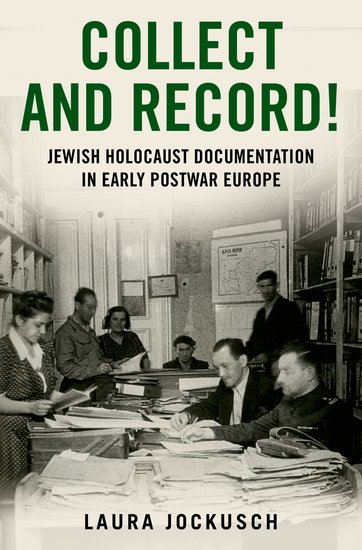Laura Jockusch, Collect and Record: Jewish Holocaust Documentation in Early Postwar Europe (Oxford University Press, 2012).
Laura Rockusch has performed an inspiring service in producing her book, Collect and Record. Contrary to many people’s assumptions that Holocaust survivors were quiet, traumatized, passive from the war’s end to the Eichmann trial in 1961, she examines how Jews in Poland, France, and in Displaced Person Camps in Germany and Austria immediately set work to gather anything they could on what he just happened to their people during the 12 years of the Third Reich.
There were precursors for this kind of work; for example, at the end of World War I, the number of Jews killed in Ukraine in pogroms numbered between 50,000 and 100,00. Researchers then sought to gather accounts from witnesses and survivors. Here’s one message: “Brothers! A curse of terrible pogroms is befalling Jewish villages and towns, and the world does not know, we ourselves do not know or know only very little about it. This must not be concealed! Everything must be told and written down. It is a duty for every Jew who has come or comes from the devastated Jewish towns to report everything that he has seen, for the news must not be lost.” Khurbn-Forshung was the name given to this activity—Yiddish for “Destruction Research.”
Elie Wiesel’s famous memoir Night was first written in Yiddish and published in Argentina in 1956; it was subsequently translated into French as a quite different work in 1958. Yet long before, many hundreds of people worked tirelessly to create institutes and research centers in Paris, London, Warsaw, and Jerusalem that would tell future generations what the “civilized” Germans had done. Researchers in Poland insisted on the “sense of civic duty of everyone in Poland, and especially to the conscience of those Jews who possess diaries: do not keep them to yourselves! Help to uncover the historical truth of the bloody German Hitler regime!”
In doing this transnational work, survivors confronted methodological and theoretical issues that would demand the attention of Holocaust historians decades later, involving matters such as objectivity, representation, interpretation, and trauma.
During the war, Alexander Donat noted that if the Germans proved to be victorious, the annihilation of the Jews “will be presented as one of the most beautiful pages of world history, and future generations will pay tribute to them as dauntless crusaders.” Jockusch’s engrossing study pays tribute to those Holocaust survivors who amassed every scrap of their lifeworlds the Nazis sought to destroy and so laid the foundation for “a history from below,” from the perspective of the victims.

1 Comment